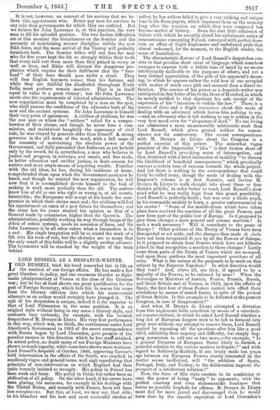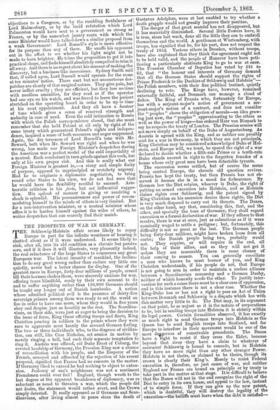LORD RUSSELL AS A DESPATCH-WRITER. L ORD RUSSELL tried his band
somewhat late in life on the conduct of our foreign affairs. He has made a few great blunders in policy, and one enormous blunder as diplo- matic plenipotentiary at Vienna at the close of the Crimean war; but he has at least shown one great qualification for the post of Foreign Secretary, which bids fair to rescue his name from the literary oblivion into which his unsuccessful attempts as an author would certainly have plunged it. The style of his despatches is unique, indeed it is far superior to that of Lord Palmerston in the same position. It is an original style without being in any sense a literary style, and contrasts very curiously, for example, with the bookish despatches of M. Drouyn de Lhuys. His very first performance in this way, which was, wo think, the continuance under Lord Aberdeen's Government in 1863 of the secret correspondence with Russia begun by Lord Clarendon, gave promise of the peculiar success in this direction which he has sine attained. In actual policy, no doubt many of our Foreign Ministers have .shown as much sagacity, while some have shown more wariness. Lord Russell's despatch of October, 1860, approving Cavour's bold intervention in the affairs of the South, was couched in needlessly vague and general terms, well nigh repudiating that principle of non-intervention on which England had then quite recently insisted so strongly. His policy in Poland has been weak and fussy. His policy in China has rather been an abdication of all policy. On the other hand, if his errors have been glaring, his successes, for example in his dealings with the United States, and recently with France, have not been less conspicuous. But this, at least, we may say, that alike in his blunders and his best and most successful strokes of policy, he has seldom failed to give a very striking and unique tone to his State papers, which impresses them on the memory long after the occasion on which they were composed has become matter of history. Even the curt little admission of failure with which he recently closed his unfortunate series of remonstrances concerning Poland, conveyed with perfect deco- rum an effect of frigid displeasure and undefeated pride that almost redeemed, for the moment, to the English reader, the sense of humiliation.
And when M. Drouyn de Lhuys attempted a diversion from this unpleasant little catechism by means of a catecheti- cal counter-irritant, in which he asked Lord Russell whether a long list of European dangers were to be left to ferment into great wars without any attempt to remove them, Lord Russell replied by repeating all the questions after him like a good child, admitting their urgency and difficulty, but simply beg- ging permission to add one or two more,—for example, " Is a general Congress of European States likely to furnish a peaceful solution to the various matters in dispute ?" and with regard to Schleswig-Holstein, if one treaty made ten years ago between six European Powers closely interested in the matter seems ineffectual, will " the addition of Spain, Portugal, Italy, and Turkey, to the deliberation improve the prospect of a satisfactory solution ?"
Now, the force of this style consists in its combining at once the power of being "nasty " to opponents, with the perfect courtesy and "even statesmanlike frankness that leaves no possible loophole for offence. M. Drouyn de Limit must feel far more jarred and discouraged than he would have done by the smooth exposition of Lord Clarendon's































 Previous page
Previous page